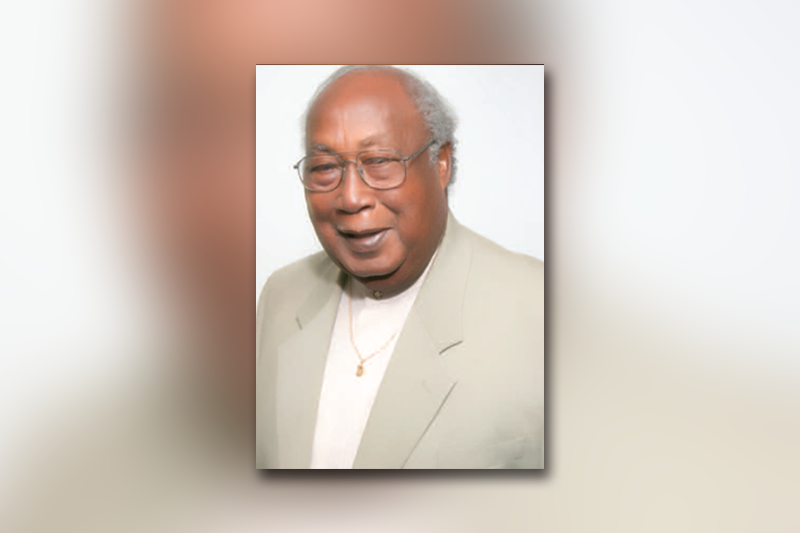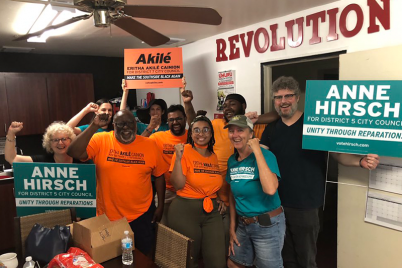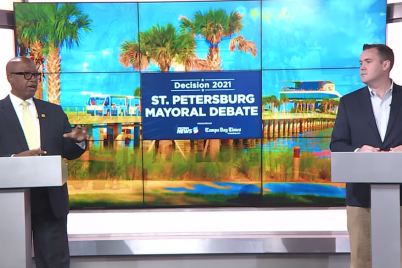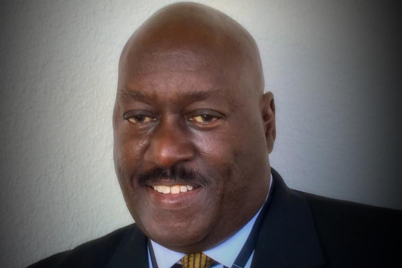David Tyrone Welch, scion of a pioneer St. Petersburg family, former city council member, and a community leader who worked to improve his city for more than a half-century, died Monday after a long illness. He was 85.
BY JON WILSON | Staff Writer
ST. PETERSBURG — David Tyrone Welch, scion of a pioneer St. Petersburg family, former city council member, and a community leader who worked to improve his city for more than a half-century, died Monday after a long illness. He was 85.
Besides his stature as a community leader and spokesman, Dr. Welch was a respected businessman. He had operated Welch Accounting & Tax Service at 1601 16th St. S since 1966. He was among the first to integrate that section of 16th Street, where African Americans were for years forbidden to live or have businesses south of 15th Avenue South.
The St. Petersburg native grew up near the 22nd Street South and Seventh Avenue neighborhood. His parents, Flagmon and Gussie Welch, came to St. Petersburg in 1917 from Alachua County. From them, Dr. Welch once said he and his brothers learned “responsibility, honesty, spirituality and unity.”
News of his death brought a cascade of condolences on social media. By Tuesday night, hundreds of acknowledgments and notes had been posted on Facebook.
He served on the St. Petersburg City Council for 12 years and championed the University of South Florida, Worknet of Pinellas, Weed & Seed of St. Petersburg, and St. Petersburg Chamber of Commerce.
Many public officials in the Tampa Bay area recalled Dr. Welch. Among them, U.S. Rep. Kathy Castor, D-Tampa, said: “Dr. David Welch was an inspirational leader for our community. He led by example as a well-respected St. Petersburg businessman, who was also revered for the time he invested to mentor future St. Petersburg business and community leaders.”
Castor noted that Dr. Welch had been a steady champion of the University of South Florida as well. “My thoughts and prayers are with Commissioner Ken Welch and all of Dr. Welch’s family, and I hope they are comforted by the legacy he has left for our Tampa Bay neighbors.”
His son, County Commission chair Ken Welch, expressed his appreciation to all.
“The Welch family would like to thank the Tampa Bay community for the outpouring of support and condolences on the passing of Dr. David T. Welch. It is a humbling recognition of his devoted service to our community,” Ken Welch said in a statement.
Dr. Welch, ever emphasizing the importance of education for young people, was himself devoted to a lifelong learning track. A graduate of Jordan Elementary and Gibbs High School, he earned bachelor’s and master’s degrees at Florida A&M University in finance, accounting, and administration. He kept studying and, in 1978, received an education specialist degree in management and public policy from the University of South Florida; he earned his doctorate in those disciplines from Nova University in 1979.
Two years later, by now a seasoned leader, Dr. Welch was elected to the St. Petersburg City Council, only the second African American to serve on that body (C. Bette Wimbish was the first a decade earlier).
The Evening Independent, at the time St. Petersburg’s afternoon daily paper, said this about Welch’s victory:
“In electing Dr. David Welch, St. Petersburg turned to a new kind of candidate. He is highly educated, a man of faith, with long years of experience in helping pull the community together, from the streets of desegregation conflict to the paneled offices of decision-making.
He also happens to be black, the first black male in the city’s history to serve on the City Council.”
He went on to serve a total of 12 years but lost a race for mayor in 1991. Tropicana Field was built during his watch on the council – ironically near the spot where his father had operated a wood yard since 1925.
Dr. Welch’s community activism and his quest for civil rights began early. During the 1950s, for example, he was among the people who pushed for integration of Spa Beach downtown. Although city fathers stalled, hemmed and hawed, the beach eventually was integrated with no major incidents.
But his toughest challenge as a community leader came in 1968, when the city’s sanitation workers, most of them black, went on strike for higher wages. The strike lasted for 116 days and produced ongoing tension and violent civil disorder. Dr. Welch was among the leaders who helped settle the dispute and calm the city and 86 garbage collectors went back to work.
Dr. Welch and City Manager Lynn Andrews called a joint press conference to announce the end of the strike.
“He did a terrific job of communicating,” Andrews said at the time.
In the wake of the trouble, an organization called the Community Alliance was formed. It was a coalition of black and white leaders whose purpose was to address racial disparities and, it was hoped, bring all of the city together. Dr. Welch became the alliance’s first black co-chairman. Don Spicer, a construction executive who later became mayor, was the white co-chair.
One of his guiding principles was that St. Petersburg should be a single entity, and during his community and public service years, he consistently made the point that he sought equal rights and fair play for all citizens. Indeed, he objected to calling part of the city “Midtown,” saying the name suggested something less than a unified St. Petersburg.
Dr. Welch took his quest for harmony into the schools, serving as a director of a controversial human rights program in the Pinellas County system during the early 1970s when schools were being desegregated, sometimes acrimoniously.
A former Little League coach when youth baseball was segregated in St. Petersburg, Dr. Welch was an official at the segregation-era Gibbs Junior College. He also served as director of St. Petersburg Vo-Tech (now Pinellas Technical Education Center), where he constantly urged young people to further their education and develop “saleable” skills. He taught Sunday school at Prayer Tower Church of God in Christ, where his late brother, the Rev. Clarence Welch, was the longtime pastor.
He served on numerous community boards, among them Worknet of Pinellas and Job Corps. He was a strong advocate for Weed & Seed of St. Petersburg, a community improvement program. An Army veteran, he had served as commander of a local VFW post.
He always advocated unity and cooperation.
“Let’s get together, Republican, Democrat, Independent, and get the job done and make our community stronger. Listen to what the people are saying,” he told The Weekly Challenger in one of his last interviews several months ago.
Dr. Welch’s survivors include his wife, Alletha; his son Ken Welch; daughters Janice Welch-Watson, Katrina Welch, and CasSandra Mobley; his brother Johnny Welch; and six grandchildren.
A wake will take place this Friday, from 6-8 p.m., and the funeral on Saturday at 11 a.m. Both services will be held at Prayer Tower Church of God in Christ, 1137 37th St. S., St. Petersburg.








